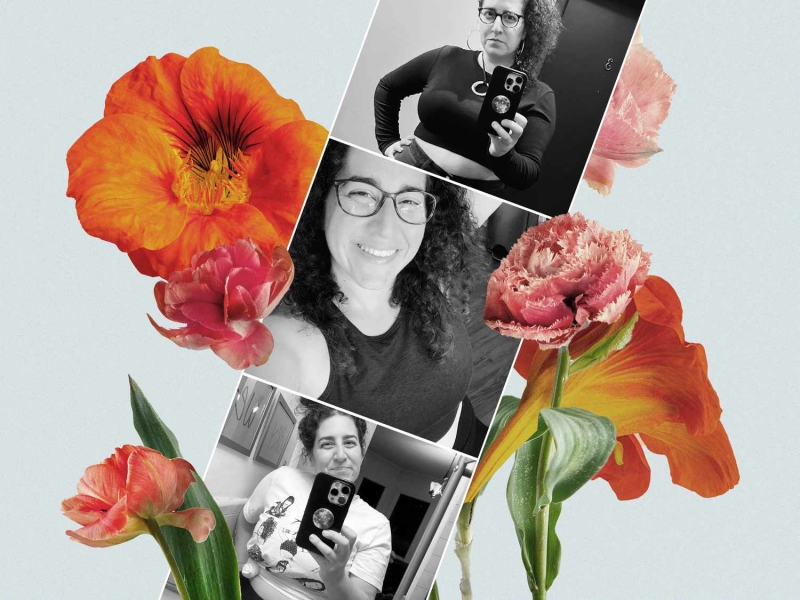For years I scrutinized my stomach daily; the crop top resurgence has helped me accept it in ways I never could before.
I am curvy, voluptuous, thick. My stomach is by no means flat. It’s mushy, malleable, full. At times it has been tighter, or a little more firm. But my stomach—like my life—has undulated, accordioned, and shifted with time.
Nearly my entire life, I forced my stomach to exist in a vacuum. A siloed section I was afraid to know. That was sometimes related to the way body dysmorphia intersected with the eating disorder I had from ages 11 to 21, sure. But my experiences of negative body image began before that. I remember judging my body shape and size—especially my stomach—as early as age 4.
As an adolescent, I started a daily practice of checking my stomach. After brushing my teeth—or even before—I’d stand sideways in front of the bathroom or closet mirror and examine my stomach’s size and shape. How flat. How rounded. How coarse. At friends’ houses or at school or in dance class, I’d stand in front of full-length mirrors, running my hands like a windshield wiper back and forth between my lower torso and ribs. At sleepaway camp, I’d even stand on my trunk to line up with the bathroom mirror. I’d do anything to get my fix. To examine. To pulverize. To judge. This practice would continue for decades. Even after I recovered from the eating disorder.
And while—as an adolescent and young adult—I put my stomach on scrupulous display for myself, I went to great lengths to keep it hidden from everyone else. By high school, I started covering my stomach with my black Kate Spade purse like a pet lap dog. I’d grab a pillow anytime I was sitting on a couch, chair, or bed. This habit persisted throughout college and into my 20s; my stomach: a moat.
My brief foray with bikinis in middle school (when I was anorexic) transitioned into tankinis in high school (when I was bulimic). And so, while I let the world see my body at the beach, at the pool, in locker rooms—actually being pretty unselfconscious changing clothes in general, and even during sex—I still thought about it. Constantly. The compulsive sabotaging happening inside my head reigned and raged.
But regardless of how my stomach looks or feels—both to myself and the outside world—it is now, at 41, that I have started to embrace it, expose it, show it off. And nothing has given me permission to heal my relationship with my stomach quite like wearing crop tops.
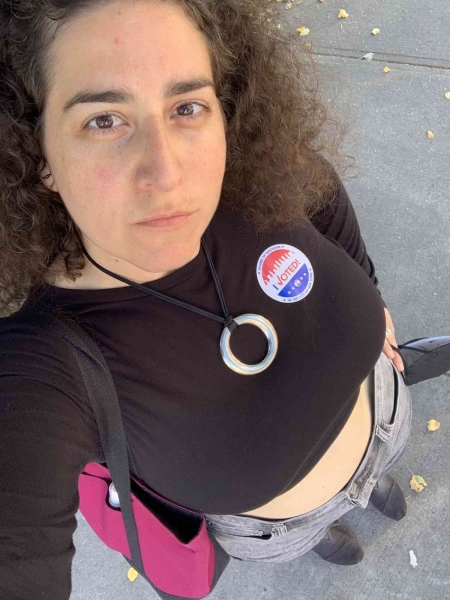
The crop top resurgence—yes, the general trend but more specifically the destigmatized all-body-shapes-sizes-and-identities-welcome shift—has been a life-affirming balm. I wear them now as a love letter to my younger self.
My wardrobe runneth over: three Girlfriend Collective tanks for working out, two Gap tanks with cute little buttons up the middle, two Old Navy rib-knit tanks, two black long-sleeves from Lulus, a red and cream Lulus sweater, a brown Madewell sweater, a black Madewell tank, a Grateful Dead sweatshirt, an off-white hoodie from Maine, and every single soft fabric T-shirt, tank, and long-sleeve I can high-knot at the curve of my waist.
Even my Bitmoji wears a crop top. A guy I hooked up with last year saved my name in his phone as “Big Booty Crop Top Caroline,” since I was—of course—wearing a black ribbed balloon-sleeve crop top from Lulus with hip-hugging Madewell jeans the night we met.
It started in late June 2020. There was an uprising and revolution. Also, a pandemic. I was healing from a concussion. I would work from my sister’s vacant office to which I’d walk from my mom’s apartment in Chicago where I was staying. I had a mask on my face, and a deep desire to show some other skin. I’m not sure if I was inspired by someone else (on Instagram or out in the world), or felt freer thanks to shifting clothing rules as many people worked from home, or if the societal expectations rooted in white supremacy, patriarchy, ableism, and anti-fat bias were turning, but I felt the urge to tie a knot in my beige 90210 “Senioritis” T-shirt right under my breasts and go rogue.
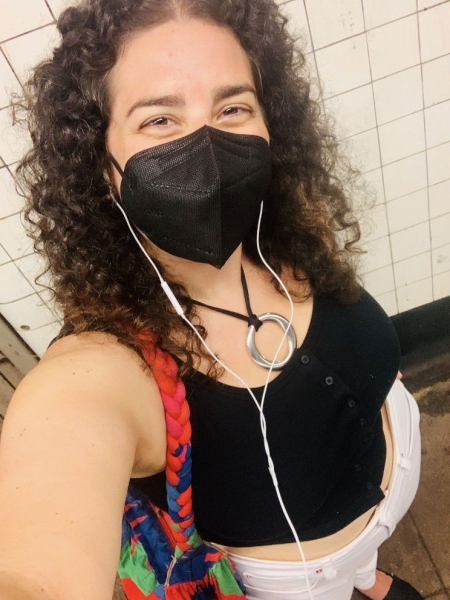

I know, intellectually, that I could have worn a crop top earlier, at any time. But something told me I couldn’t. Maybe it was internal, maybe it was external, maybe both.
The first time a lover kissed my stomach, I cried. Our third date. I was 25. To know my stomach could be kissed, since it’s physically impossible for me to kiss it myself, since I’d never shown it that level of kindness before, offered a model for what I’d need to do myself.
Over time, I tried. In my early 30s, as I continued to scrutinize my stomach, I realized I never doubted the stretch marks on my inner thighs. Zigzags crawling from my bikini line across the canvas of my skin. What magic there, I thought. That my body knew how to finger paint. That my own skin knew how to spread itself wide.
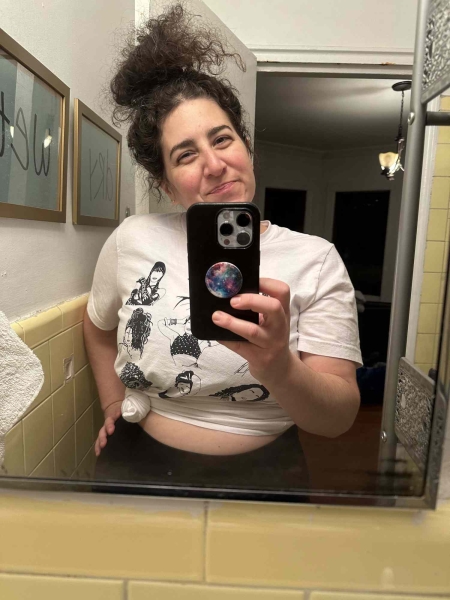
And still, my stomach was tundra. A vast space of uncharted knowing. Like I learned about it in geography class. I knew it was real. But I’d banished it away. And crop tops—the literal act of exposing my midriff to the world—would help me better uncover myself.
They would help me reclaim my right to exist.
Since I started wearing crop tops, I’ve let the daily “checking my stomach” ritual go. Maybe because I am so open to showing the rest of the world, the need to overanalyze has waned. I’ll still do it sometimes. But as an afterthought. A curiosity. Not first thing in the morning. Every day. As a way to pass extreme judgment, or calibrate my worth.
Crop tops put displaying my stomach in my control. For so much of my life, other people have tried to control my narrative, whether it was when I was what doctors deemed “overweight,” or what others deemed “skinny,” both during and after my eating disorder, or through the fat-shaming I’ve experienced (by strangers and people I know). I find the ways we comment on each other’s bodies without consent to be utterly exhausting and harmful. In any direction. It’s all part of systemic harm.
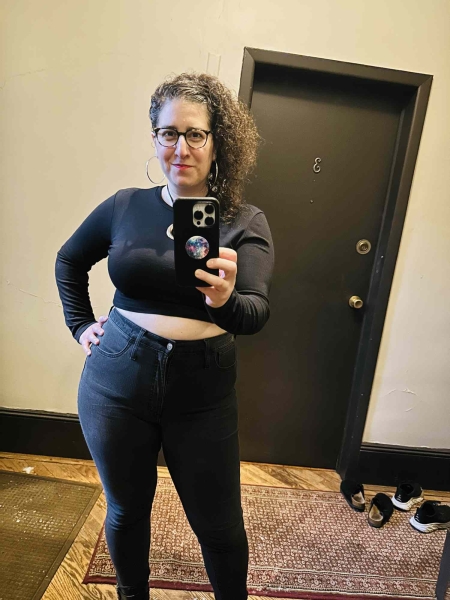
So choosing what I wear is an act of resistance. No one comments on my stomach when I’m exposing it. Maybe it’s because I give off an air of confidence. Maybe it’s because bodies of all shapes and sizes are sporting crop tops these days. I might get a “cute outfit” or something referencing the clothes themselves, but my stomach remains in my own domain.
But let’s be clear. This isn’t fantasy. Just because I’m wearing crop tops year-round doesn’t mean I don’t still judge myself sometimes. Or that I don’t have to continue to work to find a deeper love with this part of my body that has held so much trauma, pain, and grief. Sometimes I look in the mirror at my body and think: not perfect enough. Sometimes I sit and my stomach rolls bulge into a ripple and I am amazed. Sometimes I loathe those same ripples and want to fill the undulating waves of my ocean stomach skin with sand. Like it can dry out the rolls. Like salt. Let it ferment into something other than itself. But still, too, sometimes I like my stretch marks so much I rub my fingers over their creases and worship the crevices.
My stomach organ is the thing that’s been digesting and nourishing my entire life. It does revelatory work. So it would make sense that the container—what’s happening on the outside amidst all this luscious fat—is finally nourishing me too.
